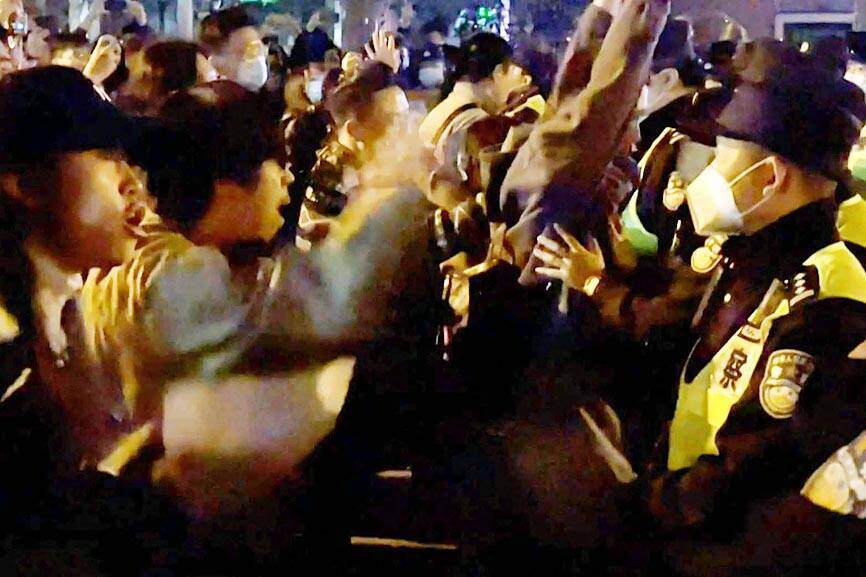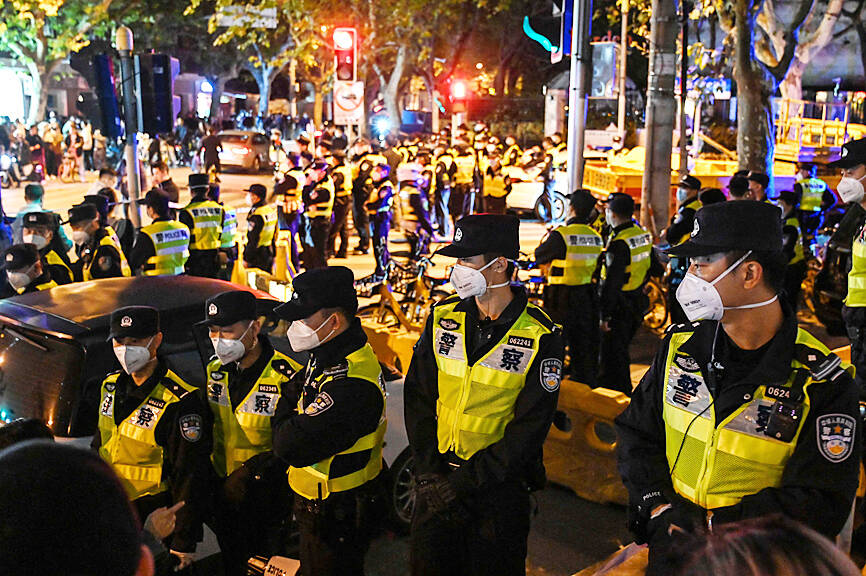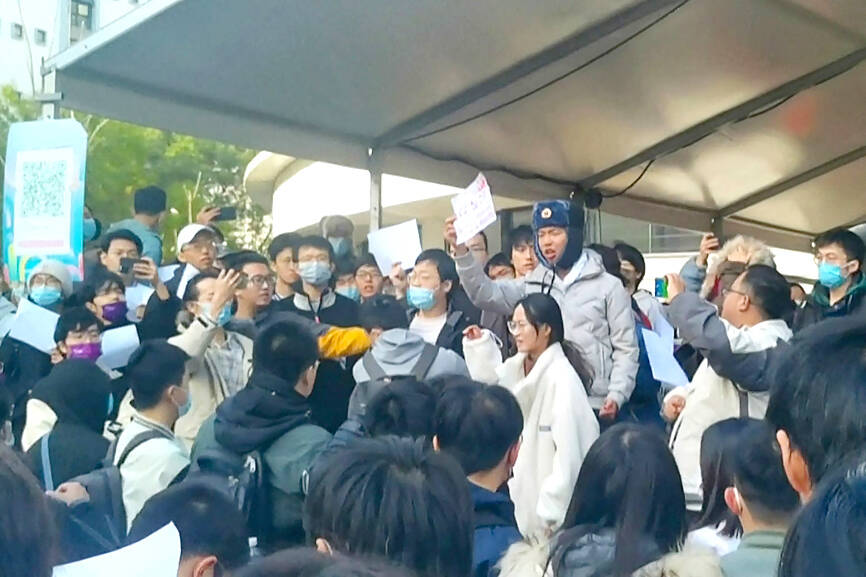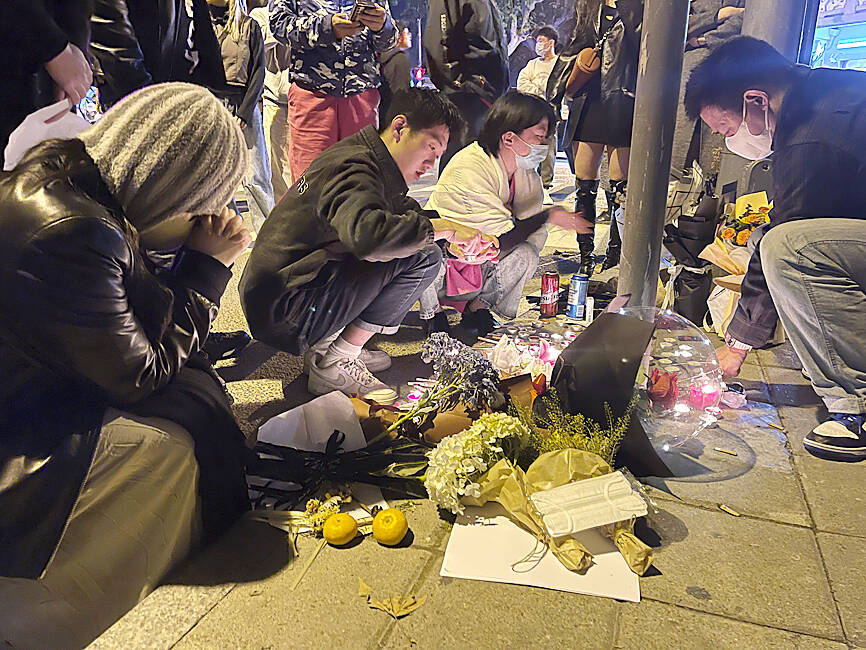Hundreds of people yesterday took to the streets in Beijing and Shanghai to protest China’s “zero COVID” policy in a rare outpouring of public anger against the state.
China’s hardline disease prevention strategy is stoking public frustration, with many growing weary of snap lockdowns, lengthy quarantines and mass testing campaigns.
A deadly fire on Thursday in Urumqi, the capital of China’s Xinjiang region, has become a fresh catalyst for anger, with many blaming lengthy COVID-19 lockdowns for hampering rescue efforts.

Photo: AFP
Authorities deny the claims.
Hundreds yesterday rallied at Beijing’s elite Tsinghua University to protest against lockdowns, said one witness who asked to remain anonymous.
“At 11:30am, students started holding up signs at the entrance of the canteen, then more and more people joined. Now there are 200 to 300 people,” the person said.

Photo: AFP
Participants sang the national anthem and The Internationale — a standard of the international communist movement — and chanted “freedom will prevail” and “no to lockdowns, we want freedom,” they said.
They described students holding up blank pieces of paper, a symbolic protest against censorship.
A video that appeared to be taken at the same location, but was quickly taken down, showed students shouting: “Democracy and the rule of law, freedom of expression.”

Photo: AFP
Other vigils took place overnight at universities across China, while videos from Xian, Guangzhou and Wuhan showed similar small protests.
Hundreds of people gathered in downtown Shanghai yesterday afternoon near where a demonstration had erupted just hours earlier, an eyewitness said.
Demonstrators holding blank pieces of paper and white flowers stood silently at several intersections, the person said, speaking on condition of anonymity.

Photo: AP
Footage from the area showed a crowd chanting during what appeared to be the late afternoon.
Later in the evening, an Agence France-Presse reporter saw a heavy security presence.
Dozens of police in yellow high-visibility jackets formed a thick line, cordoning off the streets where the protests had taken place, while their colleagues asked people to leave the area.
Crowds had gathered hours before on nearby Wulumuqi Street — named for Urumqi in Mandarin — with video showing protesters chanting: “Xi Jinping, step down; CCP, step down” in a rare display of public opposition to the Chinese Communist Party’s top leadership.
A person who attended the Shanghai protests but asked not to be identified said that the first rally was in full swing at 2am, with one group mourning the 10 people killed in the Urumqi fire, while another group chanted slogans.
Footage taken by an eyewitness showed a large crowd shouting and raising blank pieces of paper as they faced several lines of police.
Multiple witnesses said several people were taken away by the police.
Authorities were swift to curb online discussion of the protest, with related phrases scrubbed from Sina Weibo almost immediately after footage of the rallies emerged.
China’s state broadcaster is also cutting close-up shots of maskless fans at the FIFA World Cup in Qatar, after early coverage sparked anger at home.
During a live broadcast of yesterday’s group game between Japan and Costa Rica, state broadcaster CCTV Sports replaced close-up shots of maskless fans waving flags with images of players, officials or the soccer stadium.

CHAOS: Iranians took to the streets playing celebratory music after reports of Khamenei’s death on Saturday, while mourners also gathered in Tehran yesterday Iranian Supreme Leader Ayatollah Ali Khamenei was killed in a major attack on Iran launched by Israel and the US, throwing the future of the Islamic republic into doubt and raising the risk of regional instability. Iranian state television and the state-run IRNA news agency announced the 86-year-old’s death early yesterday. US President Donald Trump said it gave Iranians their “greatest chance” to “take back” their country. The announcements came after a joint US and Israeli aerial bombardment that targeted Iranian military and governmental sites. Trump said the “heavy and pinpoint bombing” would continue through the week or as long

TRUST: The KMT said it respected the US’ timing and considerations, and hoped it would continue to honor its commitments to helping Taiwan bolster its defenses and deterrence US President Donald Trump is delaying a multibillion-dollar arms sale to Taiwan to ensure his visit to Beijing is successful, a New York Times report said. The weapons sales package has stalled in the US Department of State, the report said, citing US officials it did not identify. The White House has told agencies not to push forward ahead of Trump’s meeting with Chinese President Xi Jinping (習近平), it said. The two last month held a phone call to discuss trade and geopolitical flashpoints ahead of the summit. Xi raised the Taiwan issue and urged the US to handle arms sales to

A magnitude 5.6 earthquake struck off the coast of Yilan County at 12:37pm today, with clear shaking felt across much of northern Taiwan. There were no immediate reports of damage. The epicenter of the quake was 16.9km east-southeast of Yilan County Hall offshore at a depth of 66.8km, Central Weather Administration (CWA) data showed. The maximum intensity registered at a 4 in Yilan County’s Nanao Township (南澳) on Taiwan’s seven-tier scale. Other parts of Yilan, as well as certain areas of Hualien County, Taipei, New Taipei City, Taoyuan, Hsinchu County, Taichung and Miaoli County, recorded intensities of 3. Residents of Yilan County and Taipei received

Taiwan has secured another breakthrough in fruit exports, with jujubes, dragon fruit and lychees approved for shipment to the EU, the Ministry of Agriculture said yesterday. The Animal and Plant Health Inspection Agency on Thursday received formal notification of the approval from the EU, the ministry said, adding that the decision was expected to expand Taiwanese fruit producers’ access to high-end European markets. Taiwan exported 126 tonnes of lychees last year, valued at US$1.48 million, with Japan accounting for 102 tonnes. Other export destinations included New Zealand, Hong Kong, the US and Australia, ministry data showed. Jujube exports totaled 103 tonnes, valued at